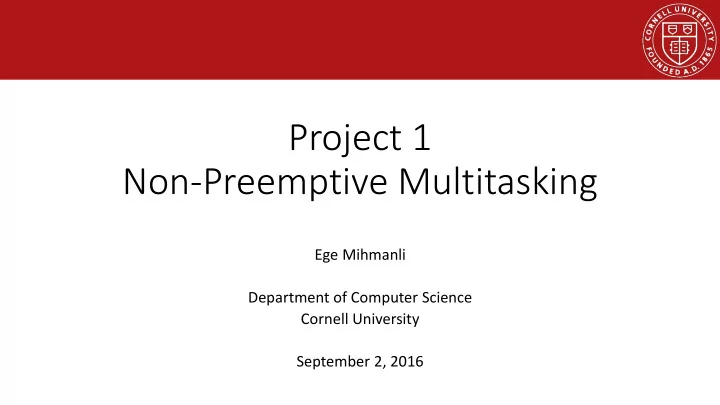

Project 1 Non-Preemptive Multitasking Ege Mihmanli Department of Computer Science Cornell University September 2, 2016
First things first • Welcome to PortOS • Project 1 is already released! • Due on September 19 th at 11:59pm 02/09/2016 Cornell University 2
GitHub • We are using github.coecis.cornell.edu • Sign in with Cornell credentials, i.e netID and password • Projects released and submitted on GitHub 02/09/2016 Cornell University 3
Goals • Ramp up for C and PortOS • Learn how threading works • Implement synchronization primitives • Large project bad coding style WILL bite later 02/09/2016 Cornell University 4
Project Overview Queue Semaphore Minithreads 02/09/2016 Cornell University 5
Project Overview Queue Semaphore Minithreads 02/09/2016 Cornell University 6
Queues • Simple FIFO Queue • Interface described in queue.h • Use a linked list under the hood • Prepend, append and dequeue must be O(1) 02/09/2016 Cornell University 7
Project Overview Queue Semaphore Minithreads 02/09/2016 Cornell University 8
What is a semaphore? • Pillar of concurrent programming • Actually, just another data structure • Keeps a count • Blocks/wakes up threads depending on situation 02/09/2016 Cornell University 9
This is a semaphore 02/09/2016 Cornell University 10
Let’s make the analogy work • Students Threads • Bouncers Semaphore • Legal max capacity Count • Room space Shared resource • Line Blocked threads 02/09/2016 Cornell University 11
Concurrency 101 • Client decides how many threads can hold a semaphore (count) • Counter is incremented/decremented atomically • P ↓ & V ↑ • P blocks if count == 0 • V wakes up blocked thread if count == 0 02/09/2016 Cornell University 12
career_fair.c take_shower(); get_dressed(); sweat_a_lot_on_your_way_over(); semaphore_p(); //attempt to walk in talk_to_employers(); exaggerate_resume(); get_swag(); semaphore_v(); //walk out complain_about_career_fair(); 02/09/2016 Cornell University 13
Project Overview Queue Semaphore Minithreads 02/09/2016 Cornell University 14
Minithreads Process User Threads Scheduler Kernel Thread 02/09/2016 Cornell University 15
Scheduler • First come first serve • Just yield CPU to thread at the head of queue • Expect this to get more complicated in Project 2 • Code style matters 02/09/2016 Cornell University 16
Minithreads • What we call threads in PortOS • Majority of the project • Will need a Thread Control Block • Stack top pointer • stack base pointer • thread ID • Anything else you want 02/09/2016 Cornell University 17
Useful functions • We provide some functions we found useful • Allocate stack minithread_allocate_stack • Initialize stack minithread_initialize_stack • Switching between threads minithread_switch • Make sure to read machineprimitives.h 02/09/2016 Cornell University 18
minithread_switch 02/09/2016 Cornell University 19
minithread_switch 02/09/2016 Cornell University 20
minithread_switch 02/09/2016 Cornell University 21
minithread_switch 02/09/2016 Cornell University 22
Bootstrapping void minithread_system_initialize • This bootstraps the system • Use it to initialize queues, semaphores, global variables or data structures • You will add more in projects to come 02/09/2016 Cornell University 23
Bootstrapping • What happens when there is no user thread left? • System shouldn’t crash! It’s an operating system • Run the idle thread • Only place where polling is OK! • In our case, the kernel thread is the idle thread • No need to allocate stack for it 02/09/2016 Cornell University 24
Being Non-Preemptive • What happens when a user thread runs forever? • In P1, we let it be! • Assume that all threads are good and voluntarily yield • Threads yield by calling minithread_yield 02/09/2016 Cornell University 25
Life of a minithread 02/09/2016 Cornell University 26
Testing • We supply a few primitive tests • Use it to see how minithreads work • Sieve and buffer are good stress tests • Remove ALL of your print statements and dead code before submission! 02/09/2016 Cornell University 27
Coding Style • Avoid unnecessary polling while (condition == False) minithread_yield(); • Unnecessary context switches are bad for you • Check for NULL arguments! (malloc can return NULL) 02/09/2016 Cornell University 28
Commenting • Helps us understand your code • Helps you understand your code • Helps you notice bugs • Helps us give partial credit for buggy cod • Notice all the “helps”? Commenting is good! 02/09/2016 Cornell University 29
Coding Style • Naming convention is important • Underscores to delimit words: • minithread_switch • number_of_eges • Constants in ALL_CAPS 02/09/2016 Cornell University 30
Coding in C • Can’t really say “I know C” without mastering pointers int *int_ptr = (int*) malloc(sizeof(int)); int_ptr = 5; • What does this do? 02/09/2016 Cornell University 31
Files you need to change • queue.c/h • synch.c/h • minithread.c/h • Important: you don’t have to change header files! • DO NOT CHANGE ANY OTHER FILE 02/09/2016 Cornell University 32
02/09/2016 Cornell University 33
? 02/09/2016 Cornell University 34
Recommend
More recommend